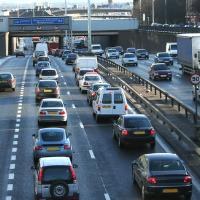(BRUSSELS) – The European Commission presented a proposal Thursday to reduce air pollution from new motor vehicles sold in the EU to meet the European Green Deal’s zero-pollution ambition.
With road transport being the largest source of air pollution in cities, the EU executive says the new Euro 7 standards will ensure cleaner vehicles on our roads and improved air quality, protecting the health of our citizens and the environment. Euro 7 standards and CO2 emission standards for vehicles work hand-in-hand to deliver air quality for citizens, as notably the increased uptake of electric vehicles also creates certain air quality benefits. The two sets of rules give the automotive supply chain a clear direction for reducing pollutant emissions, including using digital technologies.
The Commission says the new Euro 7 emission standards will ensure that cars, vans, lorries and buses are much cleaner, in real driving conditions that better reflect the situation in cities where air pollution problems are largest, and for a much longer period than under current rules. The proposal tackles emissions from tailpipes as well as from brakes and tyres. It also contributes to achieving the new stricter air quality standards proposed by the Commission on 26 October 2022.
While in 2035, all cars and vans sold in the EU will have zero CO2-emissions, in 2050, more than 20% of cars and vans and more than half of the heavier vehicles in our streets are expected to continue to emit pollutants from the tailpipe. Battery electric vehicles also still cause pollution from brakes and microplastics from tyres.
Euro 7 rules will reduce all these emissions and keep vehicles affordable to consumers, says the Commission.
The new requirements based on the Euro 7 standards:
The proposal replaces and simplifies previously separate emission rules for cars and vans (Euro 6) and lorries and buses (Euro VI). The Euro 7 standards rules bring emission limits for all motor vehicles, i.e., cars, vans, buses and lorries under a single set of rules. The new rules are fuel- and technology-neutral, placing the same limits regardless of whether the vehicle uses petrol, diesel, electric drive-trains or alternative fuels. They will help to:
- Better control emissions of air pollutants from all new vehicles: by broadening the range of driving conditions that are covered by the on-road emissions tests. These will now better reflect the range of conditions that vehicles can experience across Europe, including temperatures of up to 45°C or short trips typical of daily commutes.
- Update and tighten the limits for pollutant emissions: limits will be tightened for lorries and buses while the lowest existing limits for cars and vans will now apply regardless of the fuel used by the vehicle. The new rules also set emission limits for previously unregulated pollutants, such as nitrous oxide emissions from heavy-duty vehicles.
- Regulate emissions from brakes and tyres: the Euro 7 standards rules will be the first worldwide emission standards to move beyond regulating exhaust pipe emissions and set additional limits for particulate emissions from brakes and rules on microplastic emissions from tyres. These rules will apply to all vehicles, including electric ones.
- Ensure that new cars stay clean for longer: all vehicles will need to comply with the rules for a longer period than until now. Compliance for cars and vans will be checked until these vehicles reach 200,000 kilometres and 10 years of age. This doubles the durability requirements existing under Euro 6/VI rules (100,000 kilometres and 5 years of age). Similar increases will take place for buses and lorries.
- Support the deployment of electric vehicles: the new rules will regulate the durability of batteries installed in cars and vans in order to increase consumer confidence in electric vehicles. This will also reduce the need for replacing batteries early in the life of a vehicle, thus reducing the need for new critical raw materials required to produce batteries.
- Make full use of digital possibilities: Euro 7 rules will ensure that vehicles are not tampered with and emissions can be controlled by the authorities in an easy way by using sensors inside the vehicle to measure emissions throughout the lifetime of a vehicle.



